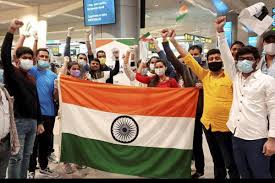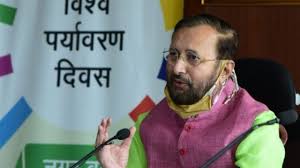Govt starts SWADES scheme for jobs opportunities to returning Indians from abroad

- The government has started a new scheme SWADES (Skilled Workers Arrival Database for Employment Support) to carry out a skill mapping exercise and present employment opportunities to the returning citizens under the Vande Bharat Mission.
Govt. Kisan Credit Cards (KCC) campaign started for 1.5 crore dairy farmers

- The Government will give Kisan Credit Card (KCC) to 1.5 crore dairy farmers relating to Milk Unions and Milk producing Companies within the succeeding two months (1st June-31st July 2020) under a exceptional drive.
PM Modi designates committee headed by Rajnath Singh for MSME loan scheme implementation

- Prime Minister Narendra Modi has selected a committee headed by Rajnath Singh to fix any problem in the implementation of the Rs 3 lakh crore collateral-free loan scheme for MSMEs.
Centre started three new schemes to support electronics manufacturing in India

- Central Government on 2nd June has declared three schemes worth Rs 50,000 crore. The schemes are Production Linked Incentive Scheme, Component Manufacturing Scheme, and Modified Electronics Manufacturing Clusters Scheme – will be executed from June 2 for the growth of the electronics manufacturing sector in India.
Central Consumer Protection Authority would be structured by the GoI

The Central Consumer Protection Authority (CCPA) would be structured by the Government of India by the first week of Aprill 2020. The authority would be set up under Consumer Protection Act 2019.
Government approves pact for seafarers’ competency certificate
The government on 22 January, 2020 approved a model pact with foreign countries for recognition of seafarers’ competency certificates. The decision was taken at a meeting of the Union Cabinet chaired by Prime Minister Narendra Modi. This will pave the way for mutual recognition of maritime education and training of seafarers by the countries involved.
The pact will facilitate unilateral recognition certificates issued by the Directorate General of Shipping to Indian seafarers by another country, without seeking similar acknowledgment by India of the certificates issued by that country. Indian seafarers will be eligible to be placed on ships under the flag of that country for employment, thus leading to increased employment opportunities, the ministry said.
‘National Startup Advisory Council’ to be set up by Government of India
The ministry of commerce has officially announced the establishment of the National Startup Advisory Council to provide representations to the Indian startup ecosystem during policy-making processes. The council will be led by union minister Piyush Goyal. The Council will advise the Government on measures needed to build a strong ecosystem for nurturing innovation and startups in the country to drive sustainable economic growth and generate large scale employment opportunities.
Although the commerce ministry hasn’t finalised on the name of the members yet, the central government will be nominating the members for a period of two years. The council will consist of founders of successful startups, entrepreneurs, representatives from incubators and investors, along with representatives from government departments and regulators that deal with startups.
State Energy Efficiency Index 2019 unveiled by Union Govt.
The Union Government has released the “State Energy Efficiency Index 2019”. The index was released during the ‘Review, Planning and Monitoring (RPM)’ meeting held in New Delhi. The index is developed by Bureau of Energy Efficiency (BEE) along with Alliance for an Energy Efficient Economy (AEEE). The SEE Index 2019 traces the expansion and achievements of Energy Efficiency (EE) drives running in 36 states and union territories. The State Energy Efficiency Index 2019 was topped by Haryana, Karnataka and Kerala while Manipur, Jammu & Kashmir, Jharkhand and Rajasthan performed worst in their respective groups.
Union Home Minister inaugurates the Indian Cyber Crime Coordination Centre
Union Home Minister Amit Shah inaugurated the Indian Cyber Crime Coordination Centre (I4C) and also dedicated National Cyber Crime Reporting Portal to the nation . This state-of-the-art Centre is located in New Delhi. The scheme to set up I4C was approved in October 2018 at an estimated cost of around 416 crore rupees to deal with all types of cyber-crimes with specific focus on crimes against women, children, particularly child pornography, child sex abuse material, online content pertaining to rapes.
At the initiative of Home Ministry, 15 States and UTs have given their consent to set up Regional Cyber Crime Coordination Centres. It constitutes 7 elements: National Cyber Crime Research and Innovation Centre, National Cyber Crime Forensic Laboratory Ecosystem, National Cyber Crime Training Centre, Cyber Crime Ecosystem Management Unit, National Cyber Crime Threat Analytics Unit, National Cyber Crime Reporting Portal and Platform for Joint Cyber Crime Investigation Team.
On the other hand, National Cyber Crime Reporting Portal (cybercrime.gov.in) is a citizen-centric initiative that will enable citizens to report cyber-crimes online through the portal. All the cyber-crime related complaints will be accessed by the concerned law enforcement agencies in the States and Union Territories for taking action as per law. This portal was launched on pilot basis on 30th August, 2019.
